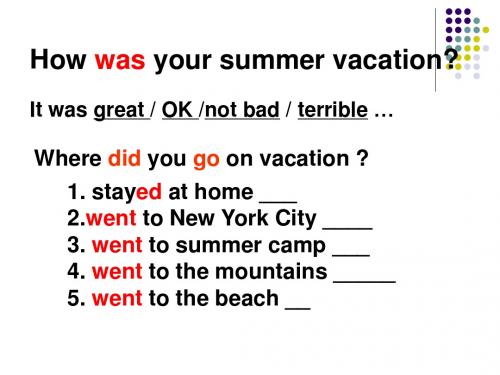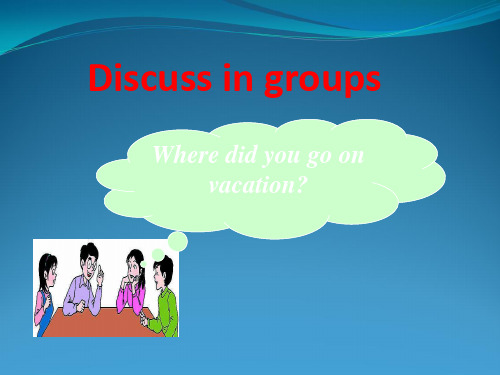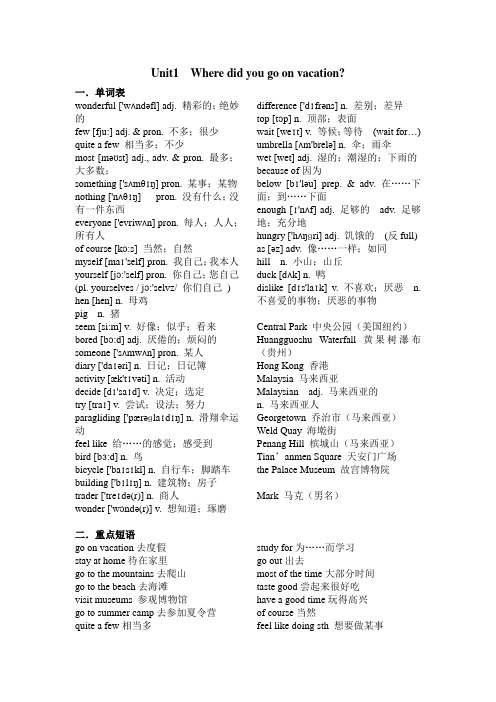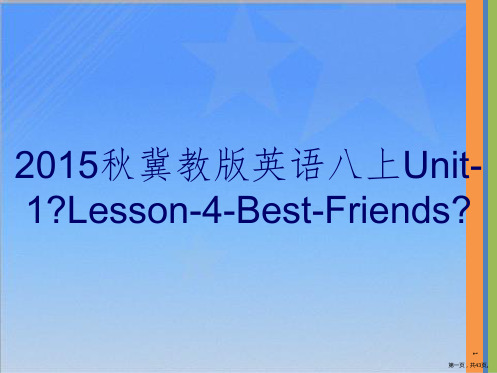2015暑期八上unit1
英语人教版八年级上unit1知识点笔记

Un i t 1 Wh e re d id yo u g o on v acation?1•一般过去时考点1:如何判断一般过去时?考点2:肯定句变否定句。
考点3:变一般疑问和特殊疑问句。
2•复合不定代词/副词构成: _________ _________ ___________ _________其中:(no one意思“______ ”指 __ ,与_________ 同义,且与of连用,做主语谓语用单三。
回答引起的特殊疑问句时要用no one.none意思“ ___ ”,指____________ ,且 __ 与of连用。
谓语单,复形式皆可。
回答 _________ 引起的特殊疑问句时要用none;-anyone意思" _____ ”扌旨___ ,与 __ 同义,且_____ 与of连用。
_any one 意思" ____ ”扌旨___ ,与 __ 同义,且_____ 与of 连用。
nothing= _________________用法:① 复合不定代词做主语,谓语动词用 ________ •②当adj.修饰不定代词要_________ •③ 当不定代词中含有some通常用于__________ ;含有any通常用于_______________我自己myself你自己他自己她自己它自己我们自己你们自己他们自己反身代词在句中可用作动词宾语、介词宾语、表语和同位语等,如:She can dress herself.作动词宾语)That?poor?boy?was?myself.(用作表语)Thefatherhimselfhassomething wrong.(同位语:句中常置于名词、代词之后或句子末尾We clean the room ourselves.(同位语:句中常置于名词、代词之后或句子末尾常用短语:穿衣服;?玩得快乐;随便吃;随便用;2.few 意为___________,修饰__________ 名词,倾向于否定。
2015年人教版新目标八年级上册英语unit 1 _A_1a-1c

go-went visit-visited play-played
practice-practiced stay-stayed study-studied
go to New York City
go-went
Where did you go on vacation ?
I went to New York City .
1b
Listen. Number the people (1-5) in the picture.
2 1 5
4
3
1b
Tapescript
Conversation 1 Xiang Hua: Hey, Tina. Where did you go on vacation? Tina: I went to the mountains with my family. Xiang Hua: Did everyone have a good time? Tina: Oh, yes. Everything was excellent. Where did you go, Xing Hua? Xiang Hua: I went to New York City.
1c
A: Where did Tina go on vacation.
1b
Tapescript
Conversation 2 Girl: What did you do on vacation, Sally? Sally: Nothing. I stayed at home. Girl: And did you do anything interesting, Bob? Bob: Yes. I visited my uncle. We went fishing, but we didn’t get any fish.
2015-2016学年人教版英语八年级上教学课件Unit1 Section A 1a–2d().

2d Role-play the conversation.
Rick: Hi, Helen. Long time no see. Helen: Hi, Rick. Yes, I was on vacation last month. Rick: Oh, did you go anywhere interesting? Helen: Yes, I went to Guizhou with my family. Rick: Wow! Did you see Huangguoshu Waterfall? Helen: Yes, I did. It was wonderful! We took quite a
1. Talk about your own vacation experience and enjoy the life.
2. 能利用课本的相关图片对听力内容进行预测。 3. 能用一般过去时和同学讨论自己的假期。 4. 通过听,检索出描述学习方法的关键词,并能 完成相关听力任务。 5. 能与同学用课文中的句型交流,熟练运用课文 中要求掌握的句子。
There’s nothing interesting in the news today.今天的 新闻里没有什么有趣的新闻。
练习题
1. Do you have _____ to do this evening? A. important something B. anything important C. something important D.important anything
few photos there .What about you? Did you do anything special last month? Rick: Not really. I just stayed at home most of the time to read and relax.
八年级上 Unit1 单词、短语、句型

Unit1 Where did you go on vacation? 一.单词表wonderful ['wʌndəfl] adj. 精彩的;绝妙的few [fju:] adj. & pron. 不多;很少quite a few 相当多;不少most [məʊst] adj., adv. & pron. 最多;大多数;something ['sʌmθɪŋ] pron. 某事;某物nothing ['nʌθɪŋ] pron. 没有什么;没有一件东西everyone ['evriwʌn] pron. 每人;人人;所有人of course [kɔ:s] 当然;自然myself [maɪ'self] pron. 我自己;我本人yourself [jɔ:'self] pron. 你自己;您自己(pl. yourselves / jɔ:'selvz/ 你们自己) hen [hen] n. 母鸡pig n. 猪seem [si:m] v. 好像;似乎;看来bored [bɔ:d] adj. 厌倦的;烦闷的someone ['sʌmwʌn] pron. 某人diary ['daɪəri] n. 日记;日记簿activity [æk'tɪvəti] n. 活动decide [dɪ'saɪd] v. 决定;选定try [traɪ] v. 尝试;设法;努力paragliding ['pærəɡlaɪdɪŋ] n. 滑翔伞运动feel like 给……的感觉;感受到bird [bɜ:d] n. 鸟bicycle ['baɪsɪkl] n. 自行车;脚踏车building ['bɪlɪŋ] n. 建筑物;房子trader ['treɪdə(r)] n. 商人wonder ['wɔndə(r)] v. 想知道;琢磨difference ['dɪfrəns] n. 差别;差异top [tɔp] n. 顶部;表面wait [weɪt] v. 等候;等待(wait for…) umbrella [ʌm'brelə] n. 伞;雨伞wet [wet] adj. 湿的;潮湿的;下雨的because of因为below [bɪ'ləu] prep. & adv. 在……下面;到……下面enough [ɪ'nʌf] adj. 足够的adv. 足够地;充分地hungry ['hʌŋɡri] adj. 饥饿的(反full) as [əz] adv. 像……一样;如同hill n. 小山;山丘duck [dʌk] n. 鸭dislike [dɪs'laɪk] v. 不喜欢;厌恶n. 不喜爱的事物;厌恶的事物Central Park 中央公园(美国纽约)Huangguoshu Waterfall 黄果树瀑布(贵州)Hong Kong 香港Malaysia 马来西亚Malaysian adj. 马来西亚的n. 马来西亚人Georgetown 乔治市(马来西亚)Weld Quay 海墘街Penang Hill 槟城山(马来西亚)Tian’anmen Square 天安门广场the Palace Museum 故宫博物院Mark 马克(男名)二.重点短语go on vacation去度假stay at home待在家里go to the mountains去爬山go to the beach去海滩visit museums 参观博物馆go to summer camp去参加夏令营quite a few相当多study for为……而学习go out出去most of the time大部分时间taste good尝起来很好吃have a good time玩得高兴of course当然feel like doing sth 想要做某事go shopping去购物in the past在过去walk around四处走走because of因为one bowl of…一碗……the next day第二天drink tea喝茶find out找出;查明go on 继续something important重要的事up and down上上下下come up出来take photos照相三.句型集萃buy sth for sb=buy sb sth 为某人买某物taste + adj. 尝起来……seem+(to be)+ adj. 看起来……keep doing sth 继续做某事arrive in+大地点/ arrive at+小地点到达某地tell sb. (not) to do sth 告诉某人(不要)做某事try doing sth. 尝试做某事try to do sth. 尽力去做某事decide to do sth 决定去做某事forget doing sth 忘记做过某事forget to do sth 忘记做某事enjoy doing sth 喜欢做某事want to do sth 想去做某事stop doing sth 停止做某事dislike doing sth 不喜欢做某事Why not do sth? 为什么不做……呢?so + adj. + that…如此……以至于……look + adj. 看起来……start doing sth.开始做某事四.复合不定代词复合不定代词是由some-,any-,no-,every-加上-one,-body,-thing所组成的不定代词。
人教版英语八年级上册unit 1

人教版英语八年级上册unit 1一、重点单词。
1. anyone.- 词性:不定代词,意为“任何人”,用于否定句和疑问句中。
例如:Did you meet anyone interesting at the party?(你在聚会上遇到有趣的人了吗?)2. anywhere?- 词性:副词,意为“在任何地方;无论何处”。
例如:I can't find my keys anywhere.(我到处都找不到我的钥匙。
)3. wonderful.- 词性:形容词,意为“精彩的;绝妙的”。
例如:We had a wonderful timeat the concert.(我们在音乐会上度过了一段美妙的时光。
)4. few.- 词性:形容词,意为“不多;很少”,修饰可数名词复数,表示否定意义。
例如:There are few apples on the tree.(树上几乎没有苹果了。
)- 区别:a few表示“一些;几个”,表示肯定意义。
例如:There are a few students in the classroom.(教室里有几个学生。
)5. most.- 词性:形容词,意为“最多的;大多数的”。
例如:Most students like English.(大多数学生喜欢英语。
)- 也可作副词,意为“最;非常”。
例如:This is the most beautiful flower.(这是最漂亮的花。
)6. something.- 词性:不定代词,意为“某事;某物”,用于肯定句中。
例如:I have something important to tell you.(我有重要的事情要告诉你。
)7. nothing.- 词性:不定代词,意为“没有什么;没有一件东西”。
例如:There is nothing in the box.(盒子里什么都没有。
)8. everyone.- 词性:不定代词,意为“每人;人人;所有人”。
2015版八年级英语上第一单元section_A1a-2d

√ √ √ √ √ √
√ √
√
2a,2b Tapescript Conversation 1 Boy: Where did you go on vacation, Grace? Grace: I went to New York City. Boy: Oh, really? Did you go with anyone? Grace: Yes, I went with my mother. Boy: Did you go to Central Park? Grace: Yes, I did. It was really nice. Boy: Did you buy anything special? Grace: Yes, I bought something for my father. Boy: Oh, really? What? Grace: I bought him a hat.
He went to New York City.
Uncle visited uncle Where did Brad go on vacation? He visited his uncle.
went to summer camp
Where did they go on vacation?
They went to summer camp.
camp
summer camp
guide
Hale Waihona Puke centralcentral park
exam
museum
stayed at home Where did she go on vacation ?
She stayed at home.
went to New York City
人教版2015八年级上册英语1单元知识点归纳

人教版2015八年级上册英语单元知识点归纳Unit1 Where did you go on vacation?短语归纳1.go on vacation去度假2.stay at home待在家里3.go to the mountains去爬山4.go to the beach去海滩5.visit museums 参观博物馆6.go to summer camp 去参加夏令营7.quite a few相当多8.study for tests为测验而学习9.go out出去10.most of the time大部分时间11.have a good time doing=have fun doing =enjoy oneself玩得高兴12.of course=sure =certainly当然13.feel like给……的感觉;感受到14.go shopping去购物15.in the past在过去16.walk around四处走走17.because of+名词短语:因为because+句子18. a/one bowl of…一碗……19. the next day第二天20.drink tea喝茶21.find out找出;查明22.go on继续23.take photos照相24.something important重要的事25.up and down上上下下e up出来come out 出版发行27.go out with anyone 跟别人出去28.say about 发表对…看法29.rain hard 雨下得大30.too much+不可数名词太多too many+可数名词复数太多much too+形容词太用法:1.buy sth. for sb. / buy sb. sth.为某人买某物2.taste / look/sound/smell good. 尝起来/看起来/听起来/闻起来不错3.nothing…but+动词原形除了……之外什么都没有4.seem+(to be)+ adj. 看起来……5.arrive in+大地点/ arrive at+小地点/get to +地点/reach +地点到达某地6.decide to do sth.决定去做某事7.try doing sth.尝试做某事/ try to do sth.尽力去做某事8.forget doing sth.忘记做过某事/ forget to do sth.忘记做某事9.enjoy doing sth.喜欢做某事10. want to do sth.想去做某事11.start doing sth.开始做某事12.stop doing sth. 停止做某事13.dislike doing sth. 不喜欢做某事14.keep doing sth.继续做某事keep on doing sth 不停做某事15.Why not do. sth.=why don’t you do sth为什么不做……呢?16.so+adj.+that+从句如此……以至于……17.tell sb. (not) to do sth. 告诉某人(不要)做某事18.enough +名词,形容词+enough19.not really .真的没有。
八年级上册英语unit1

八年级上册英语 Unit 11. IntroductionThe Unit 1 of the Eighth Grade English curriculum is an important part of the syllabus. This unit focuses on various topics, including introducing oneself and others, asking and answering questions about personal information, and talking about family and friends. In this unit, students will enhance their understanding of basic English grammar, expand their vocabulary, and improve their communication skills through various activities and exercises.2. Learning ObjectivesUpon completion of this unit, students will be able to:•Introduce themselves and others using appropriate greetings and expressions.•Use simple sentences to ask and answer questions about personal information.•Describe family members and friends using basic adjectives and possessive pronouns.•Engage in dialogues and conversations related to personal information, family, and friends.•Understand and apply basic grammar rules, including subject-verb agreement and the use of possessive adjectives.•Expand vocabulary related to family and personal information.3. VocabularyThis unit introduces several important vocabulary words related to personal information, family, and relationships. Some of the key vocabulary words include:1.Greet - to say hello or welcome someone.2.Introduce - to present or make someone known to others.rmation - facts or details about someone or something.4.Family - a group consisting of parents and their children, livingtogether as a unit.5.Friend - a person with whom one has a bond of mutual affection,typically one exclusive of sexual or familial relations.6.Question - a sentence worded or expressed so as to elicit information.7.Answer - a spoken or written reply or response to a question, request,letter, etc.4. GrammarThe Unit 1 also covers various grammar topics that are essential for effective communication in English. Some of the main grammar points emphasized in this unit are:Subject-Verb AgreementIn English grammar, the subject and verb must agree in number and person. If the subject is singular, the verb must also be singular, and if the subject is plural, the verb must be plural as well. For example:•She is my friend. (singular subject)•They are my friends. (plural subject)Possessive AdjectivesPossessive adjectives are used to show ownership or possession. The possessive adjectives in English are。
2015秋冀教版英语八上Unit-1《Lesson-4-Best-Friends》

如今的孩子们花费了太多的时间在看电视上。
• She spent 150 yuan on this dress.
她买这条裙子花了150元。
第十七页,共43页。
17
4. But to his surprise, Patrick didn’t agree. 但是,使他吃惊的是帕特里克并不同意。
2015秋冀教版英语八上Unit1?Lesson-4-Best-Friends?
第一页,共43页。
1
Unit 1
Me and My Class
Lesson 4 I Best Friends
第二页,共43页。
2
Words
pea n. 豌豆
pod copy surprise
n. 豆荚
v.抄写,复制 n. 复制品 n. 意想不到的事
9
Objectives: 1.To listen and understand the
conversation about the best friends
2.To learn to talk about friendship with some key words and useful expressions
basketball.
那样,他就有更多的时间打篮球。
spend 花费,主语为人,既可以表示花费时间也可表示花费
金钱,常用句型为:
sb. spend + 时间/金钱 + on sth. sb. spend + 时间/金钱 + (in) doing sth. • The children today spend too much time (in)
这两个朋友分开了,再也没有见过面。
2015人教版八年级上Unit1练习教材

一.根据汉语提示填写单词。
1. Where did you go on(假期 )?2. — Is there(任何东西 ) special in today ’s newspaper?— Yes, there’s a report about my favorite singer.3. Did you go (任何地方 ) interesting in summer holiday?4. (壮观的 ).5. ( 大多数 ) of the students went to Central Park yesterday.二.用括号内所给单词的适当形式填空。
6. We visited many (wonder) places last summer vacation.7. Did you go (camp) with your friends yesterday afternoon?8. The math exam was too difficult for (anyone) to pass.9. Miss Chen works in a (center) city of France.10. — What did you do yesterday evening, Gina?— I(watch) Titanic 3D in the City Cinema.三.选择填空。
( ) 11. —Where did you go vacation?— I went to the mountains.( ( ( (A. onB. toC. atD. with) 12. —they find anything interesting?— Yes, they.A. Were; wereB. Do; doC. Did; didD. Was; was ) 13. We saw interesting old things in the museum yesterday.A. quite a littleB. a quite fewC. quite a fewD. quite many ) 14. — Did Tom see anything special on the beach?— No, he saw.A. somethingB. nothingC. anythingD. no one) 15. — Did you go interesting this weekend?— No, I stayed at home with my parents.A. somethingB. anythingC. nowhereD. anywhere四.根据汉语提示完成句子,一空一词。
- 1、下载文档前请自行甄别文档内容的完整性,平台不提供额外的编辑、内容补充、找答案等附加服务。
- 2、"仅部分预览"的文档,不可在线预览部分如存在完整性等问题,可反馈申请退款(可完整预览的文档不适用该条件!)。
- 3、如文档侵犯您的权益,请联系客服反馈,我们会尽快为您处理(人工客服工作时间:9:00-18:30)。
八上Unit 1 基础练习一、短语及句子翻译。
(30分)1.待在家里2.参加夏令菪3.去山区4.去度假5.准备考试6.任何特别的事7.准备考试8.自然;当然9.记日记10.喜欢做11.给……的感觉;感受到12.在过去13.雨下得大14.因为15.有影响16.还要两小时17.在回家的路上18.查明19在学校郊游时20.20分钟以后21.继续(continue) 22.上升;升上1.大部分时间我只是待在家里看书和放松。
2. —你去哪儿度的假?—我去了纽约。
3. —食物怎么样?—所有东西尝起来真的很美味!4. 唯一的问题是,晚上除了阅读没有多少事情可做。
5.我真的喜欢在城里闲逛。
6.那一天是多么与众不同啊!7.因为糟糕的天气,我们看不到下面的任何东西。
8.我们等了很长时间的火车而且身上又湿又冷,因为我们忘记带雨伞了。
二、词汇运用(根据句意和首字母提示完成句子。
)(25分)1. —Is there a interesting in today’s newspaper? —No.2. —Well, a wants to win, n wants to lose. —I quite agree with you.3. —What’s wrong with my son? —N serious. Just a slight cold.4. It s like not a bad idea at the time./ She s very angry just now.5. You are old enough to dress y .6.Let’s look at the sentences b .7. Lilia likes keeping d every day before going to bed.8. It’s w to go skiing there in summer. I can’t w to go there.9. He felt b when his wife told the same story. It’s so b .10. The price of the dress is too h , I want a c one.11.We must t our best to learn English well. Let’s have a t .12. His sister d on studying abroad. 13.Can you find the d between the two pictures?14.It was very hard for me to make a d ,but I decided to leave my job.15.I have a headache. I don’t f like eating anything.16.The Great Wall is one of seven w in the world.17.It’s no w that no one knows him. He is a new comer here.18.I w why he was late for class again.19.Jenny studies hard, so she is at the t of class. She wants to be a successfult /businesswoman to run a company in the future.三、单项选择(22分)()1. As students, we should always be ready to help whenever they are in trouble.A. othersB. the otherC. the othersD. the other student ()2. —Is here? —No, John and Bob have asked for leave.A. nobodyB. anybodyC. somebodyD. everybody()3. —May I help you to choose some jeans, sir?—Yes, I’d like to try on those blue .A. pairB. oneC. twoD. ones()4. He doesn’t know English because he has studied it only weeks.A. much, a fewB. little, a fewC. few, a littleD. a few, a little ()5. Joan and Jane are too busy to help us. Let’s do it .A. themselvesB. themC. ourselvesD. us()6. Don’t lose in computer games, boys.A. yourselfB. yourselvesC. himselfD. themselves()7. Mrs Smith has two children. One is a driver and is a nurse.A. anotherB. the otherC. otherD. others()8. There is knocking at the door. Go and see who it is.A. nobodyB. somebodyC. anybodyD. everybody()9. —Does Bob work hard? —Not at all. Else could be lazier.A. SomebodyB. EverybodyC. AnybodyD. Nobody()10. —There are so many green trees on side of the street.—What a beautiful street!A. everyB. neitherC. bothD. each()11. Some people feel quite if they stay .A. lonely; lonelyB. slowly; aloneC. lonely; aloneD. carefully; lonely ()12. —Would you like to have a try? —Yes. It to be very interesting.A. seemB. seemsC. looksD. appears()13. —Is the food in this restaurant ? —Yes. There are lots of people to eat here.A. beautifulB. expensiveC. crowdedD. delicious()14. —The doctor says I need a balanced diet and exercise.—They can make a big to your health.A. decisionB. answerC. differenceD. change()15. The loud noise made us very terrible.A. feelB. feelsC. feelingD. to feel()16. Linda enjoys computer games, so she decides a new computer.A. play; buyB. playing; buyingC. playing; to buyD. to play; to buy ()17. We should keep our eyes while doing eye exercises.A. closeB. openC. closedD. opened()18. Father is sleeping. Please the children quiet.A. askB. letC. makesD. keep()19. —Our family are traveling to Germany for the Beer Festival. —!A. CongratulationsB. See you laterC. Have funD. Take care()20. Danny did all kinds of things to make the baby .A. to stop cryingB. stop cryingC. to stop to cryD. stop to cry()21. —Could you please take out the trash, Jenny? —. I’ll do it at once.A. Not at allB. You’re welcomeC. Of courseD. That’s right ( ) 22. –I ate too much for dinner. –No you couldn’t fall asleep last night.A. resultB. surpriseC. wonderD. difference。
